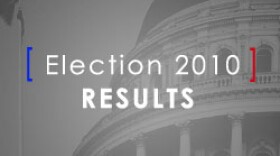The seismic event driving the 2010 midterm elections has triggered a tsunami: Republicans have swept to control of the House of Representatives.
That's the biggest story so far in a turbulent election that followed a volatile and intensely negative political campaign season.
Results so far show a decided shift to the right across the country. But Democrats held ground in some closely watched races and — with Senate Majority Leader Harry Reid's narrow win in Nevada — will manage to hold a Senate majority.
President Obama — who will see his old Senate seat occupied by Republican Paul Kirk — watched and wondered what the outcome of Tuesday's vote will mean for his agenda and his re-election hopes in 2012.
Obama called Rep. John Boehner of Ohio, who appears likely to be the new House speaker, to say he hopes to find "common ground" with Republicans.
GOP Takes It To The House
Republicans needed to pick up 39 seats to take control of the House. Results so far suggest the final total could be considerably higher.
Among those going down was Rep. Rick Boucher of Virginia, who serves on the powerful Judiciary Committee and on Energy and Commerce and has been in office 28 years.
In Indiana, Rep. Baron Hill — a moderate Democrat and fiscal conservative — was ousted by Todd Young, a veteran and lawyer who has been endorsed by Mitt Romney, the former Massachusetts governor and presidential hopeful.
South Carolina elected State Rep. Tim Scott to the House. He will be the first black Republican from the Deep South to serve there since Reconstruction — and also the first black GOP representative since Oklahoma's J.C. Watts retired in 2003.
Other longtime Democratic incumbents who lost were Ike Skelton of Missouri, chairman of the House Armed Services Committee, Paul Kanjorski of Pennsylvania (13 terms) Gene Taylor of Mississippi (10 terms) Chet Edwards of Texas (10 terms) and Allen Boyd of Florida (7 terms).
One Republican lost his seat: Rep. Joseph Cao of Louisiana.
Many Democrats elected in 2008 as President Obama reached the White House were swept out just two years later.
The wave disposed of liberals, moderates and conservative Democrats alike.
"It doesn't matter what flavor they are," said NPR's Ron Elving. "Having a D after your name is like having a target on your back."
Andrew Kohut at the Pew Center for the People and the Press cited an "enthusiasm gap." According to exit polls, conservatives were out in force, while young people and African-Americans stayed home compared with 2008.
And the middle of the electorate — independents — flipped in their loyalties.
Democrats Lose Ground In Senate, Too
With Kirk's win in Illinois, it appeared certain that Republicans had picked up five Senate seats previously held by Democrats.
In Wisconsin, the GOP's Ron Johnson knocked off longtime Sen. Russ Feingold.
Also making gains for Republicans were Dan Coats in Indiana, John Boozman (who beat Democratic incumbent Blanche Lincoln in Arkansas) and Gov. John Hoeven, who takes the seat held by retiring Democratic Sen. Byron Dorgan in North Dakota.
Tea Party favorites Rand Paul and Marco Rubio captured Kentucky and Florida, showing the strength of that new political movement. And Roy Blunt won in Missouri, keeping that Senate seat in GOP hands.
But it wasn't all Republicans all the time. In Delaware, Democrat Chris Coons was able to hold off a challenge from Tea Party candidate Christine O'Donnell.
In West Virginia, Democratic Gov. Joe Manchin claimed the Senate seat vacated by the late Sen. Robert Byrd.
And in Connecticut, longtime Attorney General Richard Blumenthal, a Democrat, was on his way to overcoming a $50 million spending spree by Republican newcomer Linda McMahon.
In Ohio, Republican Rob Portman claimed the seat vacated by fellow Republican George Voinovich. Republican newcomer Kelly Ayotte won in New Hampshire, holding on to another GOP seat. In Kansas, Jerry Moran held down the Senate seat vacated by fellow Republican Sam Brownback.
Democratic incumbents still on the job include Barbara Boxer in California; Kirsten Gillibrand and Charles Schumer in New York, Pat Leahy in Vermont and Barbara Mikulski in Maryland. Republicans holding on to their seats include John McCain in Arizona, Mike Crapo in Idaho, Richard Burr in North Carolina, Tom Coburn in Oklahoma, Johnny Isakson in Georgia, Jim DeMint in South Carolina and Richard Shelby in Alabama.
The State Of The States
Across the nation, 37 governors' offices were up for grabs, as well as control of many statehouses. State-by-state outcomes will affect redistricting decisions that could have a lasting impact on the political landscape.
In Ohio, Republican John Kasich unseated Democratic Gov. Ted Strickland.
And projections showed Republicans picking up several more governor's posts: Bill Haslam in Tennessee, Sam Brownback (the former senator) in Kansas, Rick Snyder in Michigan and U.S. Rep. Mary Fallin, who would be Oklahoma's first female governor.
Another first: Susana Martinez, the Republican who won in New Mexico, will be the nation's first Latina chief executive.
In South Carolina, voters gave the governor's job to Nikki Haley, who succeeds scandal-plagued Gov. Mark Sanford. Haley had the support of the Tea Party and former vice presidential candidate Sarah Palin. Republicans will also hang on to the statehouses in Alabama, South Dakota and Nebraska.
Democrats keep the governorships of Maryland, New Hampshire and Arkansas.
Nationally known incumbents who will keep their jobs include Texas Gov. Rick Perry on the Republican side and Massachusetts Gov. Deval Patrick for the Democrats.
Democrat Andrew Cuomo won in New York, taking the office once held by his father, Mario.
Former Republican Lincoln Chafee, running as an independent, claimed the governor's post in Rhode Island.
Who Voted?
Results from national exit polls analyzed by experts from the Pew Research Foundation at 6 p.m. indicated that 41 percent of the people who voted Tuesday call themselves conservative, up from 32 percent in 2006 and 34 percent in 2008.
A solid majority (56 percent) agreed with the statement that government is "doing too many things better left to businesses and individuals." Two years ago, a majority agreed that government "should do more to solve problems."
It's also an older electorate, with 25 percent of voters 65 or older, up from 16 percent in 2008.
Overwhelmingly, the voters disapprove of Congress — 73 percent, and majorities of both those voting Democratic and Republican.
Both political parties are viewed negatively — and equally. The unfavorable rating was 53 percent for both the Republican and the Democratic parties.
And the economy is the most important issue facing the country, according to 62 percent of voters. Fully 88 percent categorized the economy as in "not so good" or "poor" shape, while 42 percent said they are "worse off than two years ago."
Likely voters "are much more Republican, much more engaged, much more energized" in 2010 than registered voters overall, according to NPR analyst Cokie Roberts. So a key for Democrats is driving those "unengaged" voters to the polls.
NPR's Mara Liasson says likely voters have stuck with Republicans from the beginning of the campaign.
Roberts sees independent voters as key to the recent seismic shifts. This time around, independents "say they are more certain to vote than they normally do," Roberts says. In 2008, they swung to Obama and the Democrats. Now, Roberts says, they favor Republicans overall by 21 points.
Also in play are the Hispanic voters who voted overwhelmingly for Obama two years ago, Roberts says. A key figure in the GOP charge was Marco Rubio in Florida, who would be the first Hispanic Republican in the upper chamber.
It's The Economy, Stupid
The economic collapse that tore apart Wall Street even as President Obama and fellow Democrats were sweeping to power in 2008 seems to have shattered Americans' faith in the type of change they voted for two years ago.
The "throw 'em all out" sentiment was strong. Longtime public figures, including Nevada's Reid, entered Tuesday's voting knowing they could lose not just positions of power on Capitol Hill but their very jobs.
Despite the financial hard times felt across the land, a virtual fire hose of cash has fueled this year's races — $4 billion, all told. That's an 80 percent jump in congressional campaign contributions from just two years ago, according to NPR's Peter Overby.
Overby notes that most of the filings to the Federal Elections Commission for "electioneering ads" do not disclose where the money came from.
"We know the group. We know the name. We know how much they spent on the ad," Overby says. "We don't know where they got their money."
Now What?
Even after the results of Tuesday's ballots are counted, they're open to interpretation, according to many analysts. NPR's Mara Liasson sees it this way:
If Republicans succeed, they must decide whether the results give them a true mandate for an agenda that might include tax cuts, smaller government and a repeal of the federal health care overhaul.
Democrats can pin their difficulties on the bad economy and note the heavy spending attributed to conservative groups, Liasson says.
Independents could be throwing up their hands and saying government's just not working, Liasson suggests.
What's clear is that voters were not responding to any sort of coherent political message this time around — unlike 1994's GOP "Contract with America" or the criticism of the Iraq war that drove Democratic gains in 2006 and 2008.
Even with the White House and eroded Senate control, Democrats may not be able to get much done in these highly partisan times. Even with a 59-41 advantage (which includes two independents who caucus with the Democrats) they had trouble achieving a 60-vote, filibuster-proof supermajority.
A sweeping Republican victory could raise more questions than it answers, at least in the short term. Many who are running and will be elected as Republicans Tuesday — including Tea Party candidates — are really unknown quantities to mainstream party leaders.






